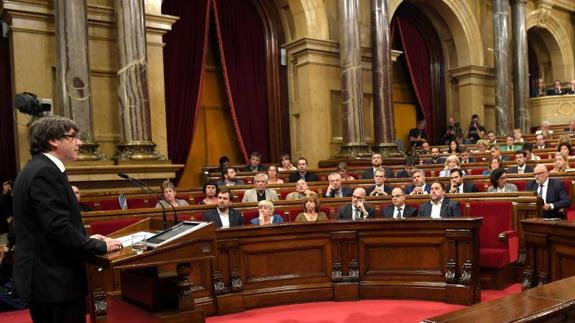Puigdemont proposes putting independence declaration on hold and calls for dialogue
The president of the Catalan region spoke of delaying the region's separation from Spain in the hope of the Spanish government agreeing to opening a period of talks
SUR
Martes, 10 de octubre 2017, 19:30
Speaking in the Catalan parliament on Tuesday, regional president Carles Puigdemont, said Catalonia would be independent, but that it would wait in the hope that the central government would agree to a period of talks.
He announced a "delayed independence" in order to reach an "agreed solution".
Puigdemont said that there are many "serious proposals" for mediation, "some of them difficult to imagine not long ago".
He said, "Catalonia has earned the right to be independent and to be heard and respected."
Spanish prime minister Mariano Rajoy is due to appear in Congreso on Wednesday afternoon to talk of the Catalonia crisis.
Earlier on Tuesday, Catalonia's regional police, the Mossos, closed off the park that surrounds the regional parliament building in Barcelona to the public ahead of the MPs' session, keeping away demonstrators.
The pro-independence supporters who had said that they would march in favour of a unilateral declaration of independence whatever Puigdemont announced, had agreed to move back their protest to the roads around the perimeter of the park and not in front of the building itself.
The Tuesday session had been called by Puigdemont with the promise of a statement on the political effects of the banned referendum a week last Sunday. The regional parliament was meeting one day later than originally expected. The planned Monday session, which was announced as a debate on independence last week, also had a ban placed on it by Spain's constitutional court even before it could be officially convened by the parliament's speaker after a complaint by the regional Socialist party.
In the end the Catalan government opted for a less inflammatory call for the parliament to meet a day later on Tuesday for Puigdemont's political statement.
However this didn't prevent intense speculation leading up to the session over what Puigdemont would say. Some commentators suggested he would make a declaration of independence but not a proclamation, a subtle distinction which would provide more time to organise a future Catalan state or a negotiated settlement with Madrid.
Many moderate elements of the pro-independence ruling coalition in the regional government were calling for a pause in the independence process to ensure a smooth transition and to give time to gain more international support. Calls intensified as more and more Barcelona-based companies, many of which are household names, said they were changing their registered office to another city in Spain to avoid any legal uncertainty affecting their business and their trading relationship with the EU if independence was declared.
However the more left-wing republican element in the ruling coalition plus the radical CUP party, not part of the regional government but a key supporter, insisted that independence should be declared as planned after the banned referendum and promised to force Puigdemont to keep his word.
There were more pleas earlier in the day from Spanish politicians and civic leaders, as well as from European leaders, for the Catalan government not to declare unilateral independence. Donald Tusk, president of the European Council said: Today I ask [Puigdemont] to respect the constitutional order [in Spain] and to not announce a decision that makes that dialogue impossible.
Even as Puigdemont arrived at the regional parliament building close to 6pm with all Spain watching, no commentator was sure what he was going to say. Just as nobody was sure how the Spanish government would react to whichever option for his speech he chose.
